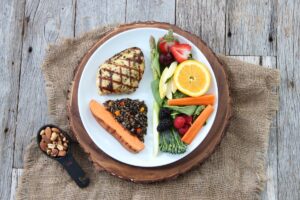Our body’s nutritional needs change over time. What we eat significantly impacts whether we remain healthy and vital as we age. Staying healthy isn’t about following trends or strict diets; it’s about knowing how to eat a balanced diet. This article offers some straightforward, practical nutrition tips to help you maintain your health, energy, and overall well-being as you age. By paying attention to your nutrition, you can lay the foundation for health, vitality, and a longer life. This will help you make the most of every stage of your life.
Understanding Nutritional Needs as We Age:
As we age, our bodies require different types of food. Our metabolism naturally slows down with age, meaning we generally need fewer calories than when we were younger. However, our needs for key nutrients generally increase. This means that every meal is an opportunity to give your body the right nutrients. Changes in the body, such as loss of muscle mass and bone density, make protein and calcium even more important. To make the most of every calorie you consume, focus on a diet rich in vitamins and minerals.
Important Nutrients for Healthy Aging:
Some nutrients are particularly important for healthy aging. Protein is essential for maintaining strong muscles, which helps you stay active and prevent falls. Lean meat, fish, beans, and eggs are all excellent sources of protein. Calcium and vitamin D work together to maintain healthy bones and reduce the risk of osteoporosis. You can get them through dairy products, fortified plant-based milks, and leafy greens. B vitamins, especially B12, are important for brain function and energy production. Fatty fish like salmon are rich in omega-3 fatty acids, which are good for both the heart and brain.
Hydration: An Essential Component
Staying hydrated is important at any age, but it becomes even more crucial as you get older. Your body may retain less fluid, and your sense of thirst may decrease, increasing your risk of dehydration. If you don’t drink enough water, you may feel worn out and confused and develop other serious health problems. Drink water throughout the day, even if you’re not thirsty. Herbal teas and water-rich foods like fruits and vegetables are also good hydration options; they help you stay hydrated and support all your body’s processes.
The Importance of Dietary Fiber and a Healthy Gut:
A healthy digestive system is crucial for your overall health. Dietary fiber is critical to maintaining a healthy gut because it promotes regular bowel movements and provides nourishment for beneficial gut bacteria. Eating more fiber from whole grains, fruits, vegetables, and legumes can help seniors avoid constipation, a common health problem. Healthy gut flora is also linked to a stronger immune system and a happier mood, making fiber an important part of a healthy diet that will help you age gracefully.
Meal Planning and Preparation Tips:
Planning makes it easier to eat healthy consistently. Planning your meals saves time and ensures you have healthy options on hand, reducing the chance of reaching for unhealthy convenience foods. Consider preparing large quantities of food at once and freezing some for later use. When grocery shopping, choose whole, unprocessed foods. Reading nutrition labels can also help you make informed choices. Choose foods low in added sugar, sodium, and harmful fats, yet rich in the nutrients your body needs.
Lifestyle Factors Related to Nutrition:
Nutrition doesn’t work in isolation. A healthy diet works best when combined with other beneficial habits. To maintain strength, balance, and flexibility, you need regular exercise. This includes aerobic exercise, strength training, and flexibility training. Getting enough sleep is also crucial for your physical and mental health. Furthermore, being socially and mentally active is also beneficial for your cognitive health and overall well-being. This is a comprehensive approach to healthy aging.
Addressing Common Nutritional Challenges:
As we age, nutrition becomes more challenging in some ways. The taste and smell of food can change, making it less appealing, and dental problems can make eating difficult. To address this, try seasoning food with herbs and spices instead of salt. If you have difficulty chewing, choose softer foods, such as smoothies, soups, and cooked vegetables. To ensure you’re getting all the nutrients you need, consult your doctor about your diet and any concerns. Certain medications can also affect your appetite or nutrient absorption.
Conclusion:
As you age, a balanced diet is one of the best things you can do for your health. It’s not about being perfect but about making regular decisions that benefit your physical and mental well-being. By focusing on essential nutrients, drinking enough water, and developing healthy habits, you can improve your quality of life and maintain your independence for years to come. Think of every meal as an investment in your future health. By starting with simple, doable changes, you’ll be on your way to a healthier, more vital life.
FAQs:
1. How many calories do I need as I age?
As you age, your metabolism slows down, so you generally need fewer calories. Your exact calorie intake depends on your activity level, but it’s best to focus on calories with high nutritional value. Consult your doctor or nurse for specific advice.
2. What are the best ways for seniors to get protein?
Lean meat, poultry, fish, eggs, and dairy products are all excellent sources of animal protein. To keep your muscles strong, you can eat beans, lentils, tofu, and quinoa.
3. How do I ensure I get enough vitamin D?
Besides sun exposure, you can also obtain vitamin D from fortified milk, breakfast cereals, and oily fish like salmon and mackerel. You may also need a supplement, especially in cold weather.
4. What are some easy ways to get extra fiber in your diet?
Eat oatmeal or high-fiber cereal for breakfast, add beans or lentils to soups and salads, choose whole-wheat bread, and eat fruits and vegetables as snacks.
5. Is it okay to take supplements?
Supplements can help address deficiencies in certain nutrients, such as vitamin B12 or vitamin D, but they should not replace a healthy diet. It is always best to consult a doctor before starting any new supplement regimen.




